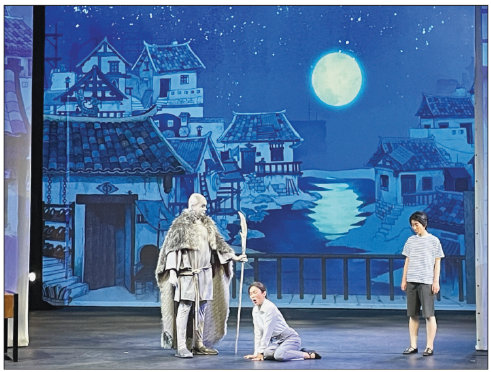Opera adaptation hits right note at London premiere
By JULIAN SHEA in London | China Daily Global | Updated: 2024-11-18 08:51

An opera based on a book by Chinese author Hong Ying received its world premiere in London on Nov 1, with the help of two British musicians who have a long and close connection with China's classical music scene.
The performance, by the Arcadian Opera company at London's Bloomsbury Theatre, consisted of two pieces inspired by a series of books with Sangsang as the central character.
The first was a narrated piece, The Girl from the French Fort, which was created for the China pavilion at the Milan Expo in 2015, and the second a new work, The Stone God, which was based on the story New Moon Rising, both composed by Nicholas Michael Smith.
The stories, set in Chongqing in Southwest China, have their roots in Hong Ying's childhood memories.
"I told my daughter traditional Chinese stories when she was growing up, so I wanted to make a contribution to the library of children's stories, and created a series of stories for her and her age range," she told China Daily, admitting that she was surprised but delighted that someone else saw the wider artistic potential in her writing.
"I've been an artist in many media — a poet, a photographer, a director, it's all interconnected, so for me, they have always been more than just words on a page. It's a lovely surprise that someone wanted to put them to music."
The Girl from the French Fort is a time-travel fantasy about a boy who meets a mysterious girl in an old barracks building on the banks of the Yangzte River.
"I used to walk past it when I was younger. When I was older, I got to go inside and I wanted to turn it into a tale," Hong explained.
The piece proved so popular, it was performed as the Shanghai Oriental Art Center's 2019 Children's Day Concert by the Ningbo Symphony Orchestra.
"The Stone God comes out of my childhood memory of strange figures, monsters and folk tales that I used to hear about," said Hong. "It's about the human condition, with themes of loss, forgiveness, and kindness, so I hope anyone at any age can embrace it, and that it will find a wide audience."
Composer Smith's relationship with China goes back more than three decades. He studied music at Cambridge University before going to a country about which he admits he knew nothing, to teach English. He soon became part of its music scene. But his involvement with The Stone God came via an indirect route.
"Previously I'd been a translator and I was asked by my friend Adam Williams, Hong Ying's husband, if I could help translate her books as the translator they had wasn't very good, which meant the book's illustrator, Cherry Denman, was drawing the wrong pictures, because she was given the wrong details," he said.
Translating the third book, Smith said its musical potential was obvious.
"It had so many good operatic themes. I began working on The Stone God at the end of 2019, then it became one of my big lockdown projects, translating it from Chinese to English, and then to the language of music," he explained.
"I hope I've created something that conjures up the image of being in China. It's set in China and I think it would be very popular if it was staged there. It has a Chinese flavor, but underneath it's just a great story that I think anyone can enjoy."
Arcadian Opera's Musical Director Justin Lavender conducted the orchestra for the performance. Like Smith, he has a long relationship with China which includes learning the language, which he said was "one of the hardest things I've ever done".
"I performed the role of Lieutenant Pinkerton in Giacomo Puccini's Madam Butterfly a lot," he said. "It was not uncommon to be the only Westerner in the company, so I realized I needed to learn basic Chinese. And when I came home, I went to evening classes and learned it up to A Level (pre-university) standard."
Being a British performer who can sing in Mandarin means Lavender, who teaches at London's Royal College of Music, has more Chinese than European students.
To be allowed to oversee the piece's premiere was, he said, "a real honor and privilege".
"It's performed in English, but four of the main characters are Chinese," he said. "Our mezzo soprano is Polish and in one scene has to sing in Mandarin, which she worked very hard to get right, and at one point so do the chorus, which was a lot of fun."
Lavender is also full of praise for Hong Ying's writing. She has written about a boy living on the banks of the Yangtze River in the late 1970s, and there's a fairytale element with a statue coming to life, and travelling back in time, so it combines the birth of modern China with traditional tales, he said.
Although the piece may be mainly in English and is written by a British composer, Smith now lives in China, so the work's Chinese roots are very apparent.
"It's a wonderfully stimulating project with a lot of pentatonic melody running through it," said Lavender.
For those who listen closely, there is a hidden musical reference very specific to the time and place that the story is set.
"Years ago, composer Xian Xinghai wrote a recruitment song for the Chinese Army, which Nick has woven it into a chorus," he said. "It will pass a lot of people by, but if you joined the army in the 1970s, you will know it."
























